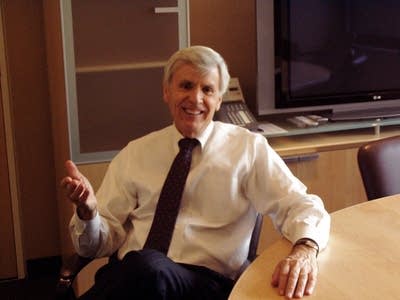MPR's parent buys radio station in Miami

American Public Media Group President and CEO Bill Kling says the company was not actively seeking new stations to buy. But he says brokers approached APMG about the Miami opportunity, and it was just too good to pass up.
"Miami is the largest city in the country that doesn't have a classical music service," Kling said. "It's also a larger city than most, and since we are one of the major classical music and arts producers in the world, and the largest in the United States, making sure we can get our programming out to people is key. And this was an opportunity to enhance our ability to send our programming to the major cities."
Kling says the deal will be funded through bond financing, and it will be paid off with donations from listeners and contributors in Florida.
News about the Florida purchase comes days after another acquisition attempt fell through. Last week, American Public Media Group's bid for WGTS, a Christian station in the Washington, D.C. area, was rebuffed.
Create a More Connected Minnesota
MPR News is your trusted resource for the news you need. With your support, MPR News brings accessible, courageous journalism and authentic conversation to everyone - free of paywalls and barriers. Your gift makes a difference.
"You don't get the opportunity to take one of your primary services and put it in a significant market, such as Miami or Washington, very often."
APMG had intended to turn that station into a news and information service, but the college that owns the station decided to hold off on a sale. That offer was in the mid-$20 million range.
Kling says despite the coincidence of the two purchase offers, APMG is not on a buying spree.
"It's hard to say that in a believable way. But you've got two unusual opportunities ... everything is an unusual opportunity, but these are very unusual. You don't get the opportunity to take one of your primary services and put it in a significant market, such as Miami or Washington, very often," he said.
WMCU was sold by Trinity International Foundation, whose purpose is to support the educational ministries of Trinity International University, an affiliate of the Evangelical Free Church of America.
WMCU is the foundation's only station. Spokesman Gary Cantwell says the foundation board regularly received offers for the radio station, which reaches about 150,000 listeners a week. Cantwell says Trinity did not sell WMCU because of financial duress.
"It's not to solve a problem, but it's an opportunity for us," he said. "We haven't decided what to do with the funds yet. But the funds will serve to expand and strengthen the educational mission of Trinity University. We feel like we play a significant role to what God is doing globally, and these funds will help us do that better."
Cantwell declined to comment on whether American Public Media was the highest bidder among the most recent batch of interested buyers. Cantwell says WMCU will likely have its last day of broadcasting in the next few weeks.
The deal comes as an interesting surprise to some observers in Florida.
Mitchell Shapiro is a communication professor at the University of Miami who specializes in broadcast programming. He says APMG won't be the first to broadcast classical music in the area.
"Historically, Miami had always had a classical radio station. It was mostly a commercial one. For a long time, this market had a very strong FM signal station that had a classical format, and it was a commercial station," he said.
Shapiro says that station abandoned its classical format about six years ago. An AM station picked up the format, only to abandon it as well.
"So if now a non-commercial station is about to pick up the classical format, my guess is that there's a need for it in this market, because historically the market has always had one," Shapiro said. "And if it's on a non-commercial station, my guess is that it won't face the economic constraints that it did when it was on the commercial station."
Shapiro says Miami is an exciting market to enter because it's always changing.
According to the classical music critic for the Miami Herald, Lawrence Johnson, the city will welcome some Beethoven.
"It's a growing and kind of lively classical music market at the present time. And I think a classical station would definitely add to it," Johnson said.
Johnson says there's strong interest in classical music in the Miami area, but he doesn't think the right players have tapped into it. He says the market supports lots of classical music performances.
American Public Media Group says it will begin programming the new classical music station in Miami as soon as feasible.
